The FIVE graphs from the OBR that should worry us all
The FIVE graphs from the OBR that should worry us all
Rachel Reeves’ budget has increased spending by £70bn annually
Don't Miss
Most Read
Trending on GB News
Chancellor Rachel Reeves announced her historic budget yesterday after months of intense speculation to a feisty House of Commons Chamber.
Headlines included increasing UK Government spending by £70 billion annually, funded in part by a whopping £40 billion worth of tax rises, the biggest single increase since records began.
But Labour's aim of achieving the best sustained growth in the G7 already look to be jeopardy after the OBR-Britain's tax and spending watchdog- downgraded UK forecasts, partly in response to Reeves' budget.
The government may have made it their mission to prioritise growth, but the OBR's ‘Economic and Fiscal Outlook’ report contains several worrying graphs endangering that mission.
Perhaps the most worrying is a gloomy growth outlook after the short term cash injection boost wears off in 2026.
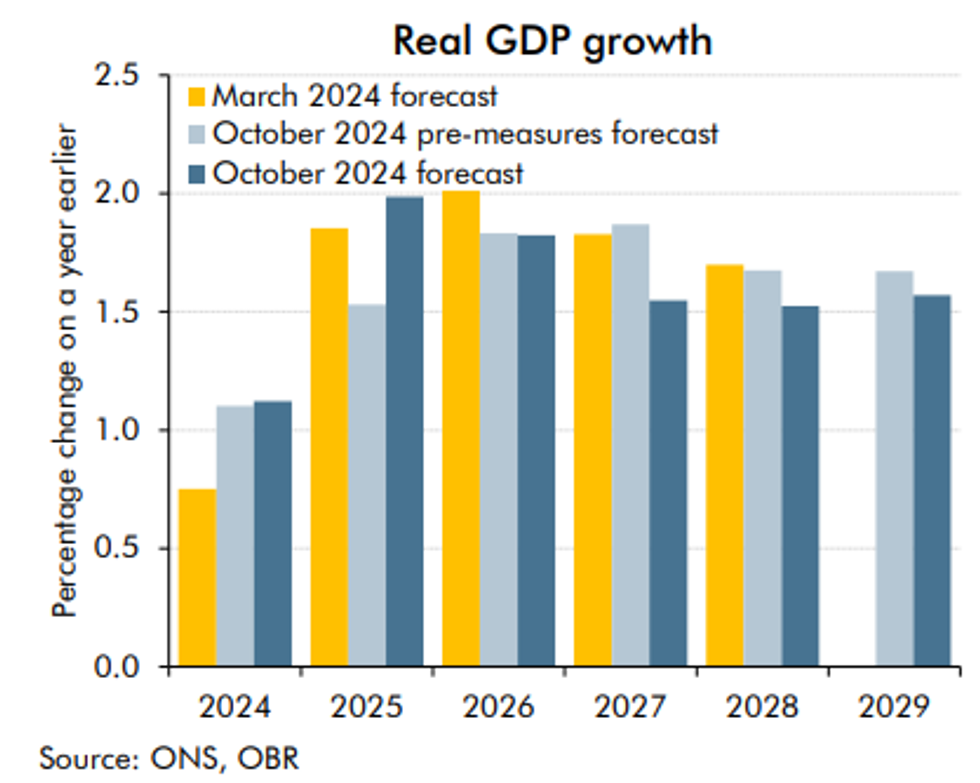
Real GDP growth forecast
OBR
The forecast clearly shows predicted growth to be lower in 2026/27/28 than it was predicted to be in March this year, a scenario Labour will desperately hope to avoid.
Liam Halligan, an economist and journalist, said on GB News last night: "The quotation from the office for Budget Responsibility is that budget policies today temporarily boost output in the near term, but leave GDP largely unchanged in five years.
"I would say that's actually quite a generous interpretation, because when you're raising employer National Insurance contributions by £25 billion, when you're imposing a minimum wage increase that's massively bigger than inflation, particularly on those small and medium sized business owners, then where is that growth going to come from?"
Another worrying graph for Labour shows the effective tax rate rising from its current new rate of 40 per cent to a massive 42.5 per cent by 2029, making Britain one of the most heavily taxed countries in Europe.
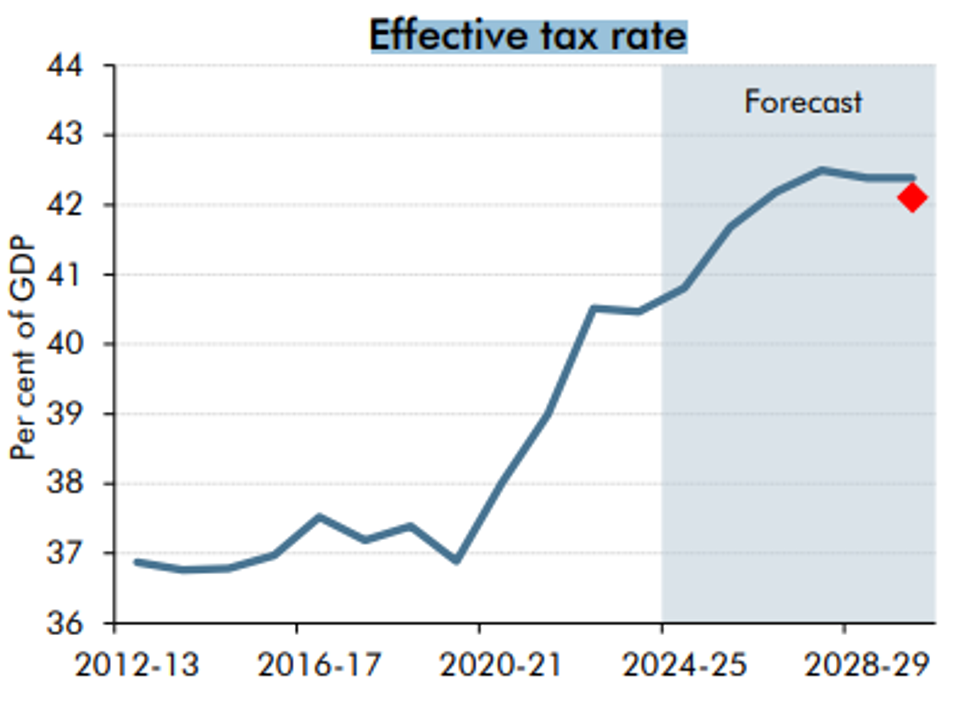
Effective Tax Rate Forecast
OBR
Similarly, taxes as a percentage of GDP are set to reach their highest rate ever at 38.2 per cent, up from 36.4 per cent.
This marks a rise of 1-2 per cent on the March forecast.
Reeves' £70 billion spending increase is mostly funded by tax rises, with the rest coming from more borrowing after the Chancellor changed the rules to allow the government to borrow more.
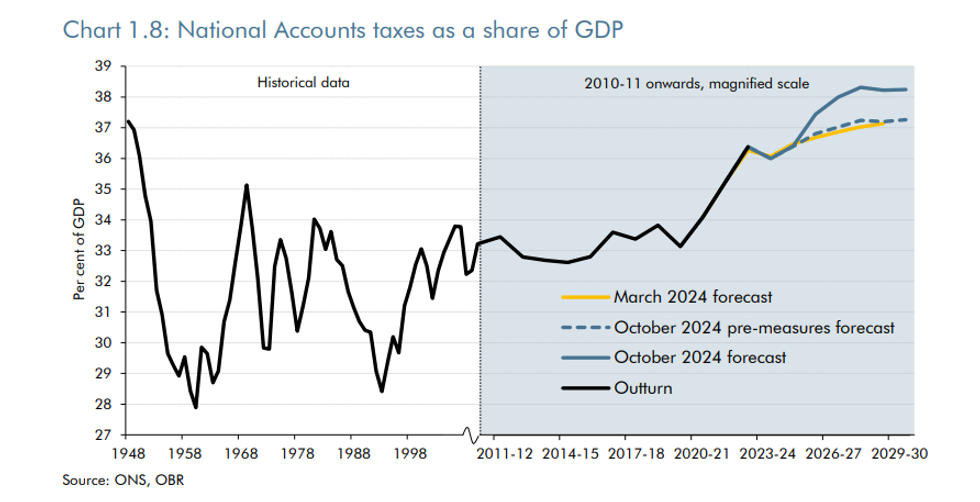
Taxes as a share of GDP
OBR
Another graph predicts public sector net debt to remain at the high rate of 97 per cent until 2029, as opposed to falling to 89 per cent as was the March prediction.
Liam Halligan, an economist and journalist, said on GB News last night: "I just feel that neither party are levelling with the public about just how big the national debt is getting.
"It's the thick end of 100 per cent of GDP. What does that mean? It means that the debt that we have to pay back as a government, albeit through time, is equivalent to the size of the entire economy in a single year.
"For context, back in 2009, before the financial crisis, the national debt was about 30 per cent of GDP, and before Covid it was about 80 per cent of GDP. It's now 100 per cent of GDP."
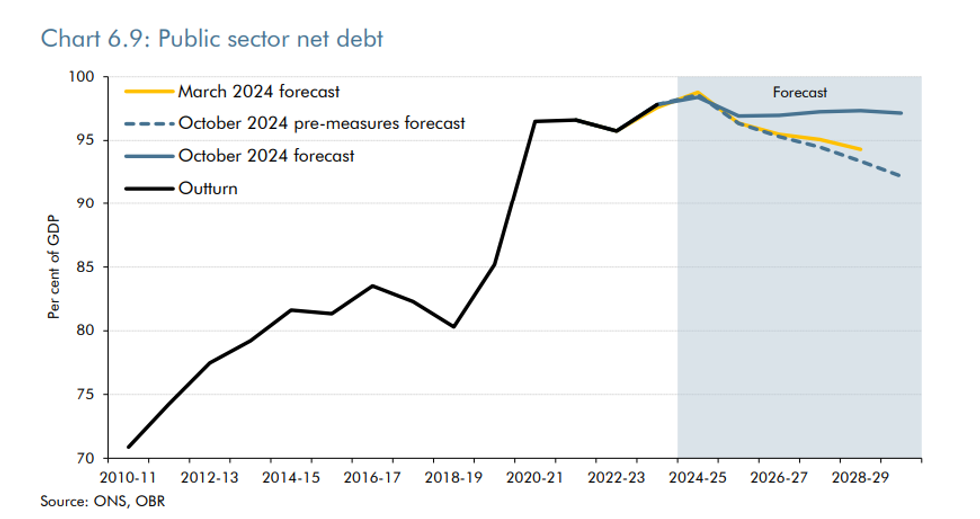
Public Sector Net debt
OBR
Lastly, a worrying graph has been published in relation to mortgage owners.
Though not as bad as the Truss/Kwarteng mini budget in 2022, it predicts mortgage rates to go up faster than under the Tories, up to 4.5 per cent by 2030 as opposed to the March prediction of just over 4 per cent.
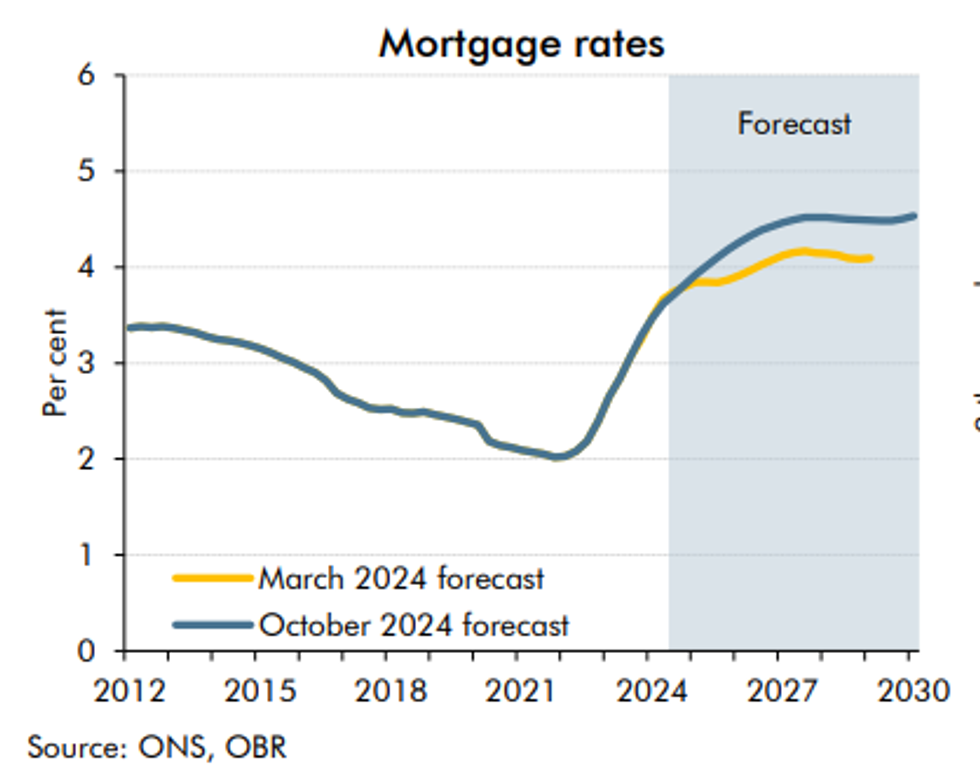
Mortgage rates
OBR
On mortgage rates, Liam Halligan said: "I did the sums. Rachel Reeves is borrowing an extra £142 billion a year over the next five years, the market has to absorb that.
"The government, of course, has to borrow off investors. It can't just conjure up money.
"My concern is that financial markets won't be able to withstand that, that they'll charge the government more to borrow. That's already happening. It started today.
"And that will push up mortgage rates and personal loans and loans that businesses take on. And that won't do anything to help growth."
Reacting to the budget, economist Roger Gewolb said: "Numerous forecasts and projections have been produced, both before and after yesterday’s Budget. We are now awash with them.
"But there seems to be a flaw with all of them. No one has projected what is going to happen to GDP, the measure against which these projections are gauged.
"Whilst mouthing the word “growth” every other sentence, Labour has produced one of the most no-growth budgets ever seen.
"They have effectively hit business with a sledgehammer and, when it recovers and adjusts itself, not only will it hit the working public badly, as well as mortgage holders, but our already poorly productive country could suffer a big fall in GDP, I believe.
"With the effective tax rate projected to move up to 42 per cent of GDP over the next few years and mortgage rates also trending higher to almost 5 per cent, I believe these figures could end up being even worse.
"And if the great projects in which the government is going to invest and run end up like HS2 – particularly run by a government where no one has actually ever worked in business - the figures could end up even worse."




